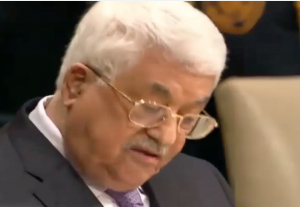
While rumors are swirling that Abbas has cancer, his personal aides maintain that the Palestinian autocrat is in good health, despite his visits to hospitals and refusal to be photographed.
By i24NEWS
A source who was present at the Fatah revolutionary council meeting told i24NEWS that Palestinian Authority President Mahmoud Abbas is suffering from health issues, once again sparking questions over who will succeed the Palestinian leader, slated to turn 83 years old at the end of the month.
Sources revealed to i24NEWS that journalists were barred from filming last week’s convening of the Fatah Revolutionary Council due to the PA chief’s deteriorating health. Abbas was also visibly agitated and much of what was discussed at the meeting was in preparation for the day the ailing leader would have to step down.

Palestinian Authority President Mahmoud Abbas – Photo AP
Last week, Abbas spoke at the launch of the Fatah Revolutionary Council, a parliamentary entity of the party. He is reported to have told members at that meeting that it was possibly his “last session” with them. “No one can guarantee his life,” Abbas said, according to reports in Arabic media.
While Abbas and his aides maintain that the Palestinian leader is in good health, rumors are swirling that he has been suffering from cancer.
At the end of February, Abbas — who was in New York to address the United Nations General Assembly — was hospitalized for a few hours at a Baltimore hospital. He was also admitted to hospital in Ramallah for tests last July.
In October, Abbas underwent a cardiac catheterization, a procedure in which a thin tube is inserted into a blood vessel in order to examine heart strength. About 20 years ago, Abbas was treated for prostate cancer, and underwent surgery.
Abbas, a longtime smoker, has long been the subject of speculation as no clear successor has been identified to fill his shoes.
Who can replace Abbas?
The situation is further complicated by the fact that Abbas holds top roles in three major Palestinian bodies, serving as chief of the Fatah party, head of the PLO Central Committee, in addition to president of the Palestinian Authority.
It is likely that each role will be filled by three different people when Abbas’ tenure comes to an end.

Last February, Abbas appointed Mahmoud al-Aloul as the deputy chief of the Fatah party, the largest party in the Palestinian Liberation Organization (PLO), making him Abbas’ de facto successor.
In May, the PLO will meet to choose a Central Committee deputy.
Israel, meanwhile, would reportedly like to see a member of the PA’s security apparatus succeed Abbas as president.
Abbas’ political rival, Mohammed Dahlan, has been garnering support in a bid to replace Abbas. In February, Dahlan met with senior Hamas officials such as Ismail Haniyeh and Fathi Hamad in Cairo amidst a rift between Hamas and Fatah.
Located in exile in the United Arab Emirates, Dahlan recently received the blessing to form his own political party, which reports say he is calling ‘The Democratic Reform Trend.’
Other prominent member of the Palestinian political sphere are also looking to position themselves as the heir to Abbas’ throne:
Saeb Erekat was the top peace negotiator for the PLO, and is considered to be a favorite of Abbas due to the loyalty that he has displayed toward him. However, Erekat has denied that he is interested in taking the reins from Abbas, and there is no consensus among Fatah regarding Erekat taking the leadership role.
Marwan Barghouti has long been considered as a potential replacement for Abbas. Considered to be one of the de facto leaders of the First and Second Intifada, Barghouti has been jailed by Israel since 2002, when he was convicted on five counts of murder. Serving five life sentences, many question whether he can properly govern from prison.
Mohammad Shtayyeh heads the Palestinian Economic Council for Development and Reconstruction (PECDAR). An academic and seasoned negotiator, he maintains relations with both Abbas and Mohammad Dahlan.

Composite photo of Mohammed Dahlan (right) and Mahmoud Abbas (left)
Jibril Rajoub, the former West Bank security chief, was considered one of the more combative members of Abbas’ inner circle, previously commenting that there was a “real leadership crisis” under Abbas. Rajoub has also become a vocal critic of Israel.
Abbas has held the Palestinian presidency since 2005. The Palestinians have not held a presidential election since then, and Abbas has remained in office despite the expiration of his term.
Arab leaders have reportedly urged the aging Abbas to name a successor in order to avoid internal chaos in the event of his resignation or inability to lead.
Abbas was still in a combative spirit at the Fatah parliamentary meeting, reportedly telling Fatah members that he did not intend to end his life as a ‘traitor’ by acquiescing to the US peace plan, especially after their recognition of Jerusalem as Israel’s capital.
View original i24NEWS publication at:
https://www.i24news.tv/en/news/international/middle-east/169361-180307-sources-abbas-suffering-from-health-issues-avoiding-being-filmed






 Israeli New Shekel Exchange Rate
Israeli New Shekel Exchange Rate